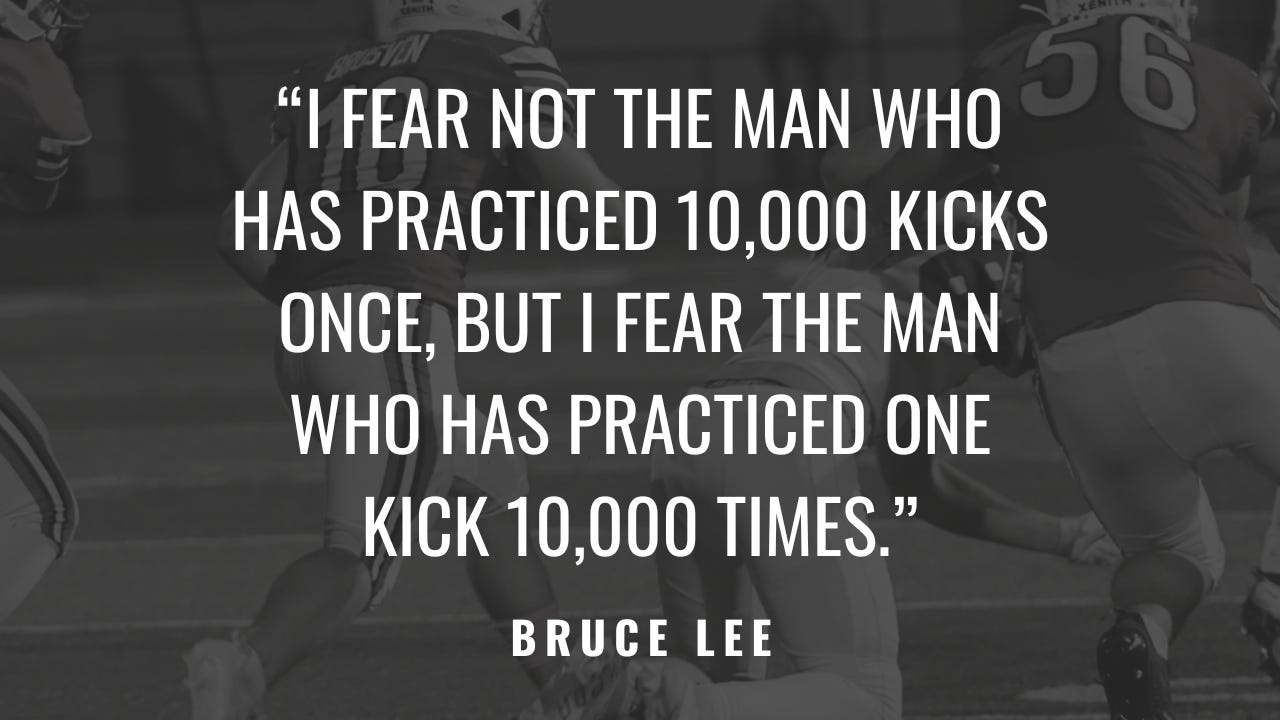Mastering Less to Achieve More
How we apply the 80/20 Principal to our offense.
As a football coach, this quote hits home. In our pursuit of offensive success, it’s easy to fall into the trap of trying to do everything: adding new plays, experimenting with trick concepts, and overloading our playbooks with ideas we’ve seen on TV or online.
But real success doesn’t come from doing more. It comes from doing less—better.
This is the essence of the 80/20 principle: 80% of your results come from 20% of your efforts.
On offense, 80% of your yards, points, and success likely come from 20% of your plays.
The key to winning isn’t adding more to your system; it’s mastering the core concepts that make your team successful.
My Journey to Simplicity
I’m a minimalist when it comes to our team’s offense now, but it wasn’t always that way.
I vividly remember a big playoff game early in my coaching career. Our offense was struggling to move the ball, so I fired through play-calls, trying to find the right one to gain momentum.
It never came, because we had no identity. The deeper I tried to dive into our playbook, the worse things got. We were trying things we had barely repped and weren’t something we had mastered.
That moment stuck with me. It showed me the importance of focusing on what works instead of trying to do it all.
It shaped who I was going forward. I picked a few plays that worked well for us and we practiced them consistently. We stopped trying to do everything and got good at a few things.
How to use the 80/20 Principle.
1. Find Your One Play
In the age of Hudl and technology, this should be easy to find. Label all of your plays and filter by yards gained. This will tell you where your yards are coming from.
My biggest word of advice is to make sure it is an adaptable play that can be run from most, if not all, personnel groups and formations. That way as your personnel changes from year to year, you can adapt it to your team.
Once you have the one play, plan your entire offense with that play in mind.
2. Trim the Fat
The tough part of living by a minimalist philosophy isn’t knowing what to run; it’s knowing what to cut out. I always felt the need to hold on to certain concepts we had always run. “But what if the defense does this?”
The truth is, that defenses only have so many looks and coverages. We only need 1 answer for each front or coverage, and the key is to build concepts that have answers vs multiple looks.
For example Snag. It is a variation of Smash but can attack multiple coverages.
Cover 2 and Man - The corner route serves as a beater for both coverages.
Cover 4 - The corner route should clear out both the safety and corner, leaving an inside-out stretch on the flat defender with the mini curl and flat route.
Cover 3 - Attaching a switch vertical concept will attack the voided hash left open by only 1 high safety.
In one concept we have an answer vs every coverage we could see. Now we can focus on repping that concept and teaching our QB how to progress through it to attack each look.
3. Reps, Reps, Reps
Instead of spending time on many plays, we spend most of our practice time on our essential ones. We break our days into specific parts of the playbook and rep the entire day.
For example:
Tuesday - Wide Zone, Key Screen, Slants, 4-Verticals
Wednesday - Inside Zone, Lock, All-Hitch, Snag
That way we can focus on teaching and coaching the finer details of everything we have.
We will add small segments of specific situations, such as goal-line, red zone, third, and long, throughout the week.
Sometimes we will have a few calls apart from the main plays specific to those situations, but most of the practice is spent on our foundational plays.
Applying
It took me a few seasons to fully embrace this principle. When we finally did, we threw everything out and started building our offense with only the essentials.
We started with Wide Zone as the foundation. Everything we added had to complement this play in some way.
First-year results:
School record in rushing
School record in passing
First 10 win season in school history
Furthest playoff run in school history
Disclaimer - We had a talented team that would have won either way. Jimmys and Joes win games, not schemes.
But what our system did was unlock their full potential. By focusing on a few core plays, we made sure our offensive line knew exactly how to block, our quarterback knew his reads inside and out, and our skill players could execute with confidence.
That’s why we not only won games but also set records.
What’s Your "One Kick"?
Think about it: what’s the one play or a few plays your team can get good at? What’s the 20% of your playbook that makes 80% of your success?
Find those plays, practice them a ton, and don’t worry about doing everything. When you master the basics, you’ll be the coach other teams don’t want to face.
You’ll frustrate opponents because they will know exactly what you are going to do, but still can’t stop it.
Being great at a few things is way better than being okay at a lot of things.





Exactly what I needed to hear in the off-season during clinic season!